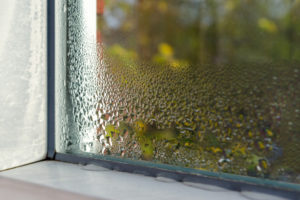Excessive Home Humidity? Here’s What You Can Do!
 During the summer months, the weather often becomes hazy, hot, and humid. Your home’s air conditioning system can help keep some of the excess moisture at bay, but there are times when the humidity is simply too much for your HVAC system to handle. And, modern homes are very airtight compared to older builds – and while that helps to hold in conditioned air both in summer and winter, it can also hold in unwanted moisture.
During the summer months, the weather often becomes hazy, hot, and humid. Your home’s air conditioning system can help keep some of the excess moisture at bay, but there are times when the humidity is simply too much for your HVAC system to handle. And, modern homes are very airtight compared to older builds – and while that helps to hold in conditioned air both in summer and winter, it can also hold in unwanted moisture.
You might suspect your home is excessively humid. Your skin might feel clammy, rugs and other fabrics might feel a bit damp, and you might notice a musty odor that doesn’t seem to go away. If you’re thinking that your home might be too humid, keep reading. We’ll share some ways you can tell if your home is too humid, and give you some advice on how we can help!
How do I know if I have too much humidity in my home?
Chances are, if your home is too humid it will show some signs of excessive moisture. Here are a few indicators that can signal overly damp air in your home:
- The air feels hot and sticky. If the air in your home feels muggy, even with the air conditioner running, it’s likely that your home’s humidity level is too high. Humid air holds the heat more than drier air does, and that can make your air conditioner have to work harder, and your home less comfortable.
- There are droplets of moisture on the windows. If you’re noticing condensation on your windows or other fixtures in your home (such as your toilet or tiled areas), the air is likely too humid.
- Mold and mildew are growing in your home. Warm, humid spaces provide a perfect place for mold and mildew to grow. If you notice a musty odor in your home, check around baseboards and in rooms like your bathroom or laundry for mold and mildew growth. If you see it, your home is probably overly humid.
- Wood seems damp, or is rotting. If you notice that the wood in your home is damp or rotting, you should act as soon as possible. Excessive humidity can cause wood rot, which in turn can lead to structural issues in your home.
Fortunately, there is help available if you notice that your home is overly humid. Whole-house dehumidifiers can be very beneficial if excessive moisture is a problem throughout your entire home. Additionally, there are stand-alone dehumidifiers that are helpful in areas prone to high humidity, such as the basement area of your home.
How can a stand-alone or whole-house dehumidifier help?
There are major benefits to choosing dehumidification for your home, including:
- Improved Health: Viruses, bacteria, mold, and other airborne pollutants thrive in high humidity. By choosing a dehumidification system for your home, you’ll be able to keep these contaminants at bay.
- Home Protection: Stored items, fabrics, carpeting, home furnishings, and other belongings can all suffer at the hands of humidity. Mildew, rot, and warping can occur in damp conditions. You can shield your home from these concerns with proper dehumidification.
- Energy Savings: You may not realize this, but overly humid air can come at a tangible expense. That’s because your air conditioner or furnace has to work extra hard when handling overly damp air. Dehumidification can help them work more efficiently – helping you save on energy bills.
How can John Betlem help me enjoy better air quality in my home?
At John Betlem, we want our customers to be as comfortable as possible in their homes, and that goes beyond simply providing expert home services like cooling, heating, insulation, and electrical work. We can also help improve your indoor air quality by offering you products that can help, such as dehumidification systems for single spaces or for your entire home. To learn more about how John Betlem can help you get the dehumidification you need, just give us a call at 585.326.4767 and we will be more than happy to help.

